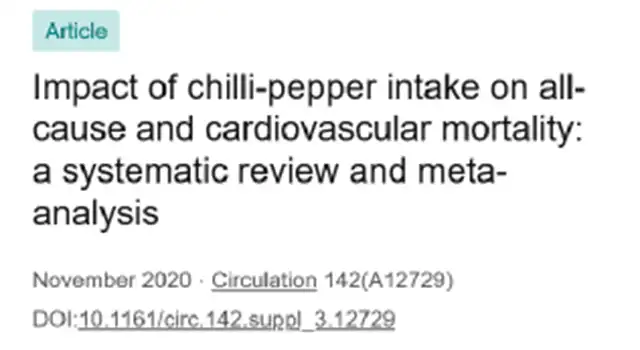Spicy Food: Anti-Cancer Longevity and Helicobacter pylori Inhibition
- Normal Liver Cells Found to Promote Cancer Metastasis to the Liver
- Nearly 80% Complete Remission: Breakthrough in ADC Anti-Tumor Treatment
- Vaccination Against Common Diseases May Prevent Dementia!
- New Alzheimer’s Disease (AD) Diagnosis and Staging Criteria
- Breakthrough in Alzheimer’s Disease: New Nasal Spray Halts Cognitive Decline by Targeting Toxic Protein
- Can the Tap Water at the Paris Olympics be Drunk Directly?
Spicy Food: Anti-Cancer Longevity and Helicobacter pylori Inhibition
- Should China be held legally responsible for the US’s $18 trillion COVID losses?
- CT Radiation Exposure Linked to Blood Cancer in Children and Adolescents
- FDA has mandated a top-level black box warning for all marketed CAR-T therapies
- Can people with high blood pressure eat peanuts?
- What is the difference between dopamine and dobutamine?
- How long can the patient live after heart stent surgery?
Spicy Food: Anti-Cancer Longevity and Helicobacter pylori Inhibition
Research indicates that consuming spicy food not only has anti-cancer and longevity benefits but also inhibits the growth of Helicobacter pylori.
Longevity is a goal pursued by everyone, and diet significantly influences our health. For example, those who have a sweet tooth tend to gain weight, while those who consume too much salt may develop high blood pressure. So, what about those who love spicy food? Is chili beneficial?
Firstly, let’s discuss the components found in chili. Chili contains an active ingredient called capsaicin, with its chemical name being trans-8-methyl-N-vanillyl-6-nonenamide (C18H27NO3). Capsaicin is the primary cause of the spiciness in chili and includes dihydrocapsaicin, nordihydrocapsaicin, homodihydrocapsaicin, and homocapsaicin in varying degrees, contributing to the different levels of spiciness.
So, what are the effects of capsaicin? Capsaicin stimulates the brain to release endorphins, inducing a temporary sense of pleasure and a feeling of increasing satisfaction with continued consumption. This explains why some people enjoy eating spicy food. Additionally, it stimulates the secretion of saliva and gastric acid, promoting digestion and absorption in the human body. The “Compendium of Materia Medica” notes that chili has a warming effect on the spleen and stomach. Furthermore, chili contains abundant vitamins that boost metabolism and enhance the body’s antioxidant capabilities.
Research indicates that capsaicin in chili has anti-inflammatory and antioxidant properties, helps in pain relief, treats muscle soreness, has anti-cancer properties, and regulates blood sugar when consumed in moderate amounts.
A study titled “Anti-inflammatory Effect of Capsaicin in Helicobacter pylori-Infected Gastric Epithelial Cells” demonstrated that capsaicin inhibits the release of the pro-inflammatory cytokine interleukin-8 (IL-8) in gastric epithelial cells infected with Helicobacter pylori through the nuclear factor kappa B (NF-kappaB) signaling pathway.

Moreover, a study published in “Circulation” revealed that long-term consumption of spicy food may contribute to “longevity.”

Researchers conducted a comprehensive search using databases such as Ovid, Cochrane, Medline, Embase, and Scopus. The analysis of 4 studies involving 570,762 participants showed that compared to those who consume little or no spicy food, individuals who eat spicy food have a 25% lower relative risk of overall mortality, a 26% lower risk of cardiovascular mortality, and a 23% lower risk of cancer mortality. However, there was no statistically significant difference in the impact on cerebrovascular accidents.
One of the studies included a prospective cohort study from Peking University, covering nearly 500,000 individuals in 10 different regions. The 7.2-year follow-up revealed that even consuming spicy food only 1-2 days per week had beneficial effects, and those eating spicy food 6 or 7 times per week had a 14% lower risk of overall mortality and a 22% lower risk of ischemic heart disease mortality.
Furthermore, for cancer patients, chili is considered beneficial. A study in “Nature” showed that consuming chili stimulates pain-sensing neurons, promoting hematopoietic stem cell production, which is beneficial for blood cancer treatment.
In the study, researchers found that 77% of hematopoietic stem cells are regulated by pain-sensing neurons. Chili intake triggers the activation of pain-sensing neurons, significantly enhancing the mobilization of hematopoietic stem cells in mice. Therefore, targeting the pain-sensing nervous system could be a strategy to increase hematopoietic stem cell production, providing hope for leukemia and lymphoma patients with abnormal hematopoietic stem cells.
In addition, a study found that the synthetic chili-like compound arvanil enhances the anticancer activity of the active ingredient SN38 in human small-cell lung cancer cells, suggesting a potential therapy for recurrent and cisplatin-resistant small-cell lung cancer.
Although chili has numerous benefits, it should not be consumed excessively, as it may not be suitable for everyone. Individuals with gastrointestinal, colorectal, or cardiovascular diseases should consume chili in moderation. Overindulgence in spicy food can lead to various health issues, including acne, constipation, sore throat, oral ulcers, and toothaches.
In conclusion, the consumption of spicy food has both advantages and disadvantages. While there are several benefits, excessive or forced consumption may have adverse effects. Particularly for individuals with health issues, it is crucial to follow medical advice and practice moderation in spicy food intake.
Spicy Food: Anti-Cancer Longevity and Helicobacter pylori Inhibition
References:
1.Abstract 12729:Impact ofChilli-pepper Intake on All-cause and Cardiovascular Mortality – A SystematicReview and Meta-analysis. Circulation. 2020;142:A12729. https://www.ahajournals.org/doi/abs/10.1161/circ.142.suppl_3.12729
2.Anti-inflammatory effect of capsaicin in Helicobacter pylori-infected gastric epithelial cells.2007 Oct;12(5):510-7.doi: 10.1111/j.1523-5378.2007.00521.x.
3.China Kadoorie Biobank Collaborative Group. Consumption of spicy foods and total and cause specific mortality: population based cohort study. BMJ 2015;351:h3942
4.Nociceptive nerves regulate haematopoietic stem cellmobilization. Nature (2020). https://doi.org/10.1038/s41586-020-03057-y
5.Capsaicin analog could help treatment-resistant lung cancer. American Society for Investigative Pathology annual meeting during the virtual Experimental Biology (EB) 2021 meeting. https://www.eurekalert.org/news-releases/890581
(source:internet, reference only)
Disclaimer of medicaltrend.org
Important Note: The information provided is for informational purposes only and should not be considered as medical advice.



